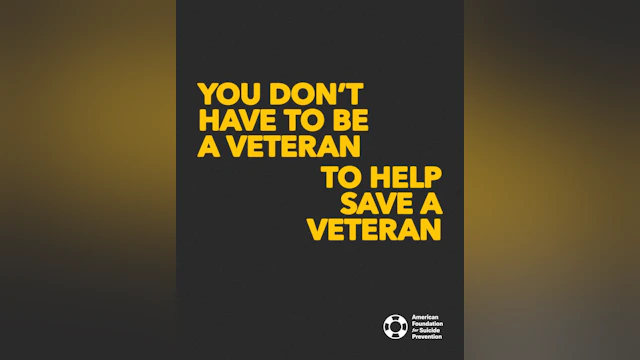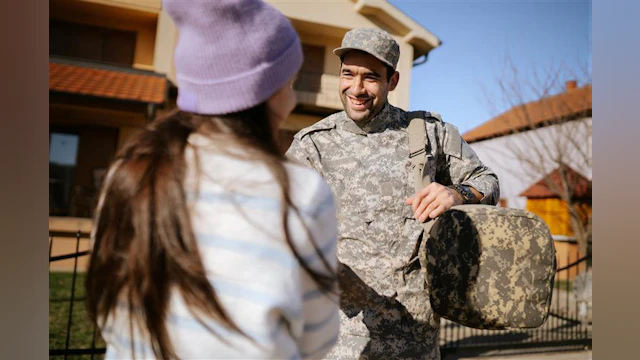NEW YORK (Nov. 3, 2025) - Veterans die by suicide at roughly a 50% higher rate than non-veterans. That’s why, the American Foundation for Suicide Prevention (AFSP), a leading suicide prevention organization, launched Talk Saves Lives: Supporting Our Veterans, a presentation aimed to show how anyone can play a role in preventing veteran suicide. Sign up to participate in one of two virtual presentations in November to commemorate Veteran’s Day here.
Talk Saves Lives: Supporting Our Veterans was created by veterans and is designed to educate general audiences, especially those without a military background, on the unique experiences and challenges veterans face and how they can support them. Through this free, one-hour presentation, available in-person or virtually, participants will learn the impact of suicide on the veteran population, how to recognize suicide warning signs in veterans and protective factors, and how to confidently communicate with a veteran who may be in distress. Talk Saves Lives: Supporting Our Veterans is an adaptation of its flagship suicide education and best in class program, Talk Saves Lives: An Introduction to Suicide Prevention.
AFSP will host two virtual presentations open to the public. Register here.
- Wednesday, Nov. 12 at 11 a.m. EST
- Tuesday, Nov. 18 at 7 p.m. EST

“Veterans are a high-risk population when it comes to suicide, and AFSP continues to prioritize building a culture that helps everyone help those who are disproportionately affected by suicide. We thank the many volunteers and staff who will step up in communities across the country to spread this lifesaving education,” AFSP Senior VP of Programs Trisha Calabrese said. To bring this program to your community, start by becoming a trained volunteer through your local AFSP chapter here.
Suicide rates among veterans have been rising faster than the rest of the population for over a decade. Many veterans have unique risk factors for suicidal thoughts or behavior,1 which may include experiences with “moral injury,”2 traumatic brain injury (TBI),3 substance use disorders4 and military sexual trauma (MST).
“As military members transition out of active duty, there are many stressors and uncertainties that come with this life change,” U.S. Navy Civilian and AFSP North Florida Chapter Board Member Kim Whetham said. “Suicide in the military and veteran communities is heart-breaking, and it’s important that not only veterans themselves have mental health resources, but their loved ones are also equipped with support and resources to care for them.”
Connecting veterans to life-saving resources is a collaborative process, as many veterans believe they must be self-reliant or are distrustful of mental health resources. Addressing the topic of veteran suicide starts with compassion, self-awareness and respect.
"As a veteran myself and suicide loss survivor, it's vital that we break the stigma, create a sense of community among our veteran and military brothers and sisters, and lead by example to save lives," U.S. Air Force Veteran, Veterans Suicide and Awareness & Remembrance Flag Corporation Founder and President and AFSP Long Island Chapter Board Member Kevin W. Hertell said. "Preventing veteran suicide is something we can all do, and it starts by creating valuable resources that help bring civilians up to speed on their lived experiences and struggles so they can better support them."
To find additional resources for veterans, visit https://afsp.org/veterans-resources/.
###
The American Foundation for Suicide Prevention is dedicated to saving lives and bringing hope to those affected by suicide, including those who have experienced a loss. AFSP creates a culture that’s smart about mental health through public education and community programs, develops suicide prevention through research and advocacy, and provides support for those affected by suicide. Led by CEO Robert Gebbia and headquartered in New York, with its Policy and Advocacy Office in Washington, D.C., AFSP has local chapters in all 50 states, D.C., and Puerto Rico, with programs and events nationwide. Learn more about AFSP in its latest Annual Report and join the conversation on suicide prevention by following AFSP on Facebook, Twitter, Instagram, YouTube, LinkedIn and TikTok.
Media interested in speaking with AFSP on this news are encouraged to fill out this press request form and review AFSP’s Ethical Reporting Guidelines.
